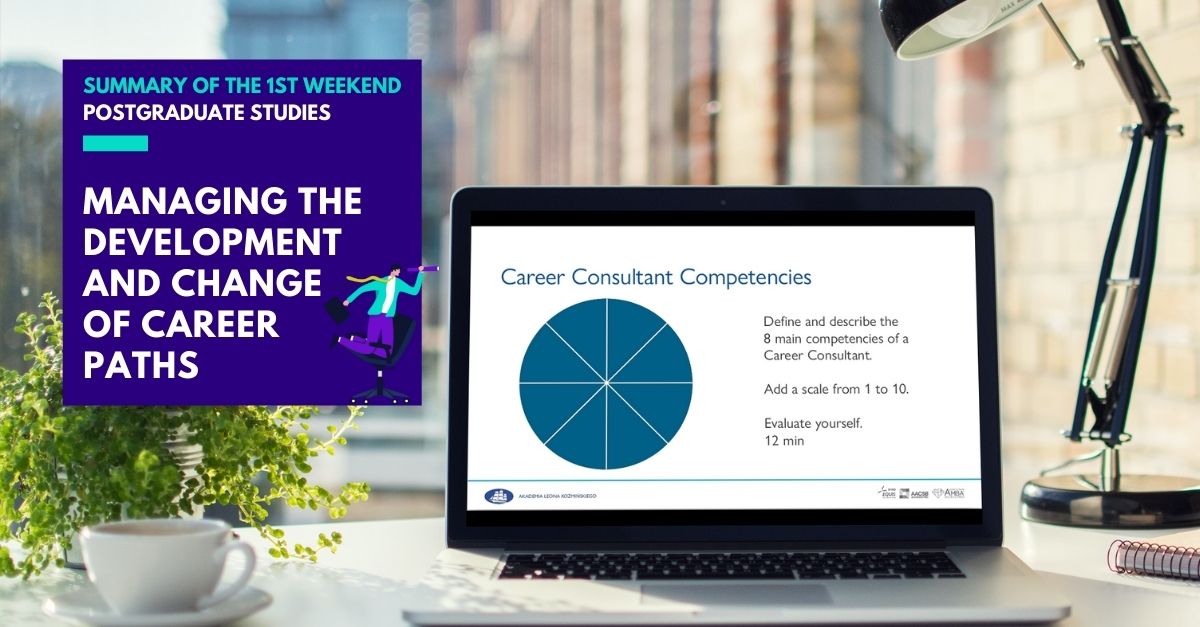To be able to advise others in the field of developing and changing their career paths, you need to understand how people make career decisions. And you should start with yourself.
We asked our students, “When you were kids, who did you want to be when you grow up?” Their answers: translator, teacher, writer, psychologist, singer, actor, tailor, dancer, “somebody who works with computers”… 75% of them “ended up” in either soft or “hard” HR in roles / positions, like coach, trainer, recruiter, HR Manager, HR BP or HR Director. The others are involved in IT, Project Management or operations. To sum up: it is a very varied, interesting and mature group. The average work experience is 18 years – beginning from 9, through 27, up to 30 years of experience.
Why Career Advisory postgraduate studies?
You ask: why would somebody who has 27 or 30 years of experience “need” such studies?
To “organize their knowledge” and to prepare for the last stage of their careers. Here are other reasons, which helped the students decide to enrol for these studies (apart from the reputation of Kozminski University and Career Angels):
- “I was in an outplacement program and I saw, how one works with a consultant. It was an interesting experience. I’ve started to support others. I want to learn, how to do it professionally. On Wednesday I joined the Open Day, on Thursday I enrolled for the studies.”
- “I collaborate with a company that supports teenagers professionally. I want to develop my own tool kit and I hope there’ll also be an exchange of ideas and sharing experiences with the other students.”
- “I appreciate the practical aspect of these studies. I want to learn how to work with a business client.”
- “I had a career consultation myself. I was impressed by the person who conducted it. I thought to myself: “I also want to be such a person.” A few months later, I saw the information, that the first edition of these studies launched.”
- “I was involved in a lot of HR areas: talent management, career paths creation, employer branding, recruitment – I want to organize my knowledge and explore new tools.”
- “I’ve been working with management boards for years. I’d like to be able to support them even better. My friend told me that she had signed up, so I did the same!”
- “I manage a big team and I am asked for advice regularly. I want to learn how to guide people in a professional and responsible way.”
- “I like helping people in the job search process. I’ve done it a couple of times – with success. One person suggested: “Maybe you should do it professionally?”. I decided, that it was a good time to start building “a second leg” [in the sense of source of income].”
On November 13, we started with lots of energy, and, and to the surprise of our students, in a very practical manner! The topic of the first weekend was “The work methodology of a Career Consultant” and it covered:
- The competencies of an effective career consultant
- Client typology
- A set of questions to diagnose client needs
- The initial interview with “prospective client”
- The Code of Ethics
“The Code of Ethics” might not seem exciting, but by adding practical examples, it comes alive, and it generates an opportunity to discuss constructively. One of the examples from the section “Scope and goal of the collaboration”:
“I’m aware of my own career preferences and possible prejudice resulting from it, which can negatively affect my advice to others.” Why is it so important? A few examples overheard from career consultants:
- “Why are you working so much? Is it worth it to sacrifice for your career?”
- “Don’t risk it.”
- “It doesn’t pay to change and earn less.”
Career Advisory postgraduate studies – first impressions
One of the most important impressions from the first weekend: we are not to judge – especially since we are doing it on impulse!
Other thoughts after three rounds of practical rounds:
- “I think that clients from other industries could be a challenge for me.”
- “Despite having questions, which I want to ask, sometimes it’s still hard to stick to the scenario, especially when the client says a lot of exciting things.”
- “Asking open questions seemed easy. All the time I feel tempted to ask guiding questions.”
- “I remind myself at every step “I assume nothing – I don’t know what I don’t know”.”
- “A client who has a lot of ideas for themselves is not as an easy client as it seems. You need to follow the conversation, and, at the same time, think about the goal.”
- “After this weekend, my brain is steaming.”
We will keep you informed about our students as well as the progress of our studies.
The enrollment for the 2022/2023 academic year has opened:
- study in Polish – details of the program
- study in English – details of the program
PS. read more about the other meetings:
Are you interested in this field and you don’t want to wait for the next edition? Follow information about our courses – also in-house – on this page:
https://careerangels.eu/become-a-career-consultant/




